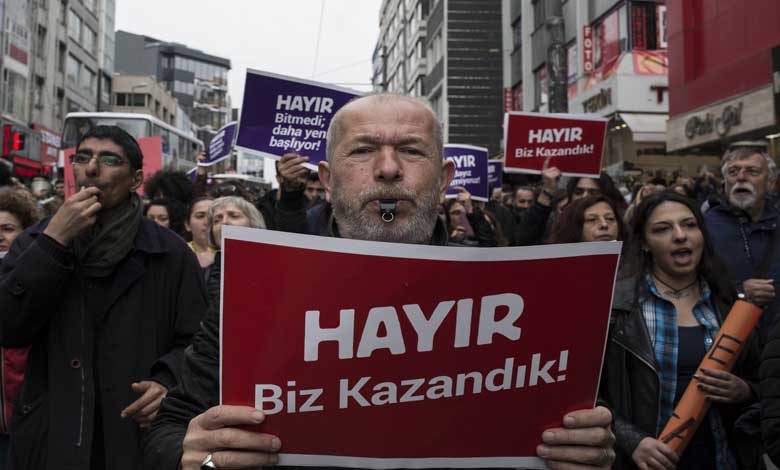Turkey : Politicizing the judiciary with presidential orders

The European Court of Human Rights has highlighted the vilification of the Turkish judicial system under Erdoğan, with the Turkish authorities having condemned for dealing with the case of Ahmet Altan, an elderly writer and thinker who was initially sentenced to life imprisonment (reduced since then to 10 years and six months) for his alleged involvement in the attempted military coup in 2016.
The European Court of Human Rights ruling concluded that there was no evidence that the petitioner’s actions were part of a plan to overthrow the government, noting that the prosecution had failed to grant Altan access to the original of the case against him as well as other due process violations.
The same can be said of the numbers imprisoned under the current regime. Erdoğan has systematically turned the Turkish judiciary into a coercive tool in the case of a permanent offensive to purge political and opposition adversaries, with the ultimate aim of stifling any opposition or criticism of him or his policies with the ultimate goal of removing all restrictions on the executive power.
In 2019 alone, some 36.066 people were investigated in Turkey for “insulting” Erdogan.
Of these, 12298 resulted in trials and 3831 convictions. One person was sentenced to 12 years and three months in prison for just seven statements he posted on social media platforms five years ago.
Sometimes judges try to reverse this trend and carry out their duties, but they will not be able to do so for long. However, such cases are rare, given that the judiciary is acting on direct instructions from the paranoid president from the opposition and coups.
If that is not enough, Erdoğan routinely brings personal lawsuits against opposition leaders for defamation. The idea is to use the state’s resources to harass and intimidate opponents under the guise of legal materials that it has enacted to protect itself and intimidate others.
The genius of the system is not only their arbitrariness, but also their unpredictability. To be critical is to live in a lost time as one can never predict when the state apparatus will be mobilized to persecute and harass someone or for any reason.
Last month, Omar Faruk Ghirlioglu, an opposition deputy and human rights activist, was revoked from parliament for supporting terrorism for retweeting a 2016 news article about a number of women who had demonstrated on International Women’s Day and were later prosecuted for “insulting the President.”
“Often, the bizarre accusations against opponents can be shocking.” Ahmed Altan and his brother Mohamed were originally accused of sending camouflaged messages to the coup plotters on television. (Mohammed has since been released, but Ahmed, of course, remains in prison.)
Arbitrariness extends to respect for court judgments. Last month, prosecutors launched a criminal case against the pro-Kurdish Peoples’ Democratic Party, the third largest party in parliament. Its leader Selahattin Demirtaş is in prison despite a 2020 ruling by Turkey’s Constitutional Court that his continued detention was unconstitutional and that he should therefore be released.
But the government ignored this decision by a Turkish court as well as a similar ruling by the European Court of Human Rights. (Turkey, by the way, is bound by the treaty to implement decisions of the European Court of Human Rights.)
Erdoğan has also ignored similar rulings on Osman Kavala, a civil society leader and philanthropist who has been the victim of fabricated charges for which there is absolutely no evidence. When the courts found no basis for the charges against him, new cases were invented as the prosecutor demanded three life terms as the sentence. The charge stems from a false coincidence – that I was in Istanbul in that fateful weekend coup I was running a seminar on Iran and had a chance to meet Kavala at a restaurant a few days later. The final ruling by the European Court of Human Rights that Kavala should be released is just another ruling that has been ignored.
Not surprisingly, even the State Department has deemed it necessary to warn U.S. citizens against reconsidering travel to Turkey because of the risk of “arbitrary detentions” based on “minimal or secret evidence and reasons that appear to be politically motivated.”
In the end, Erdoğan occupies a unique world defined by an Italian despot, Benito Mussolini, who was obsessed with insults to himself. Mussolini spent hours searching the press for anything related to him or anyone who insulted him. Erdoğan seems to be doing the same.
The future does not bode well for Turkey. The erosion of constitutional and democratic norms through the use of arbitrary tools will eventually lead to the collapse of state institutions. Once that happens, it will be almost impossible to bring the meat back to her – something Erdoğan doesn’t realize – and if he does realize it he won’t care about it because of the authoritarian obsession.












